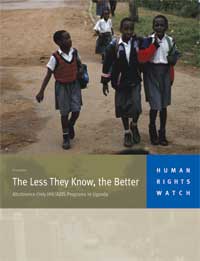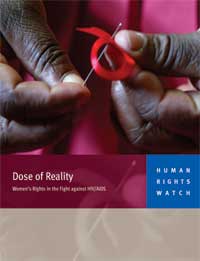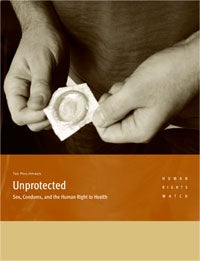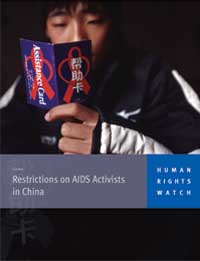 |
 |
 |
 |
“The Less They Know, the Better: Abstinence-Only and HIV/AIDS Programs in Uganda” Uganda: March 2005 Long regarded as a global leader in the fight against HIV/AIDS, Uganda—with the support and funding of the Bush Administration—has begun shifting its HIV-prevention strategies for youth from scientifically proven community-based and comprehensive prevention approaches to ideologically driven abstinence-only programs. Despite a dramatic drop in Uganda’s HIV prevalence rates over the last decade, from 15 percent in 1992 to six percent in 2002, surveys show that more than half of Ugandan girls still have sex by the age of 17, often without the use of condoms. With new programs focused on “Abstinence and Being Faithful”—the title of a draft policy released by the Ugandan AIDS Commission in 2004—AIDS advocates fear that condoms may disappear from prevention campaigns altogether. Since the release of that draft, the government has taken such measures as removing HIV/AIDS materials from primary school circulation (replacing them with books emphasizing morals and heterosexual marriage) and revoking the funding of groups that promote condom use. If Uganda is to curb the raging HIV/AIDS epidemic, it must address these damaging policy changes and initiate new prevention efforts. |
 |
“A Dose of Reality: Women’s Rights in the Fight against HIV/AIDS” Global: March 2005 |
 |
“Unprotected: Sex, Condoms, and the Human Right to Health in the Philippines” Philippines: May 2004 Condoms are the single most effective prevention technology against the sexual transmission of HIV, and the cornerstone of HIV/AIDS prevention efforts since the beginning of the epidemic. Yet in many countries – particularly those that face pressure from religious conservatives—legal and policy restrictions on condoms are fueling this epidemic. In the Philippines, the largest Catholic country in Asia, HIV/AIDS advocates who promote the use of condoms have faced an international assault. The Philippine government, under the administration of President Gloria Macapagal-Arroyo, is standing in the way of aggressive HIV prevention strategies by failing to support comprehensive reproductive health legislation. The government has banned the use of national funds for condom supplies, and permits local jurisdictions to prohibit condom distribution in health facilities. Additionally, by failing to provide proper education, the government has implicitly fueled common misconceptions about the ineffectiveness of condoms, which many Filipinos associate exclusively with sin, infidelity or sexual promiscuity. Though condoms are often available to those who can afford private health care, the poorest, most vulnerable members of society have been deprived of this lifesaving prevention method. Without proper education and the widespread availability of condoms, the Philippine government is risking premature and preventable death for many of its citizens. “I like to have plenty of condoms in my bag, but if I see the police, I throw my bag away.”
|
 |
“Restrictions on AIDS Activists in China” June 2005 After years of denial surrounding the spread of HIV/AIDS in China, senior Chinese government officials have recently begun to acknowledge and confront the existence of a rapidly growing epidemic. To its credit, the government has encouraged the growth of dozens of grassroots organizations that provide outreach and education programs to those at risk, and advocate for the rights of those infected. Yet the Chinese state remains deeply ambivalent about these groups, and NGOs face a maze of bureaucratic obstacles and harassment by local authorities. AIDS activists report being detained and harassed – even beaten – by police who want to prevent them from conducting outreach efforts or speaking to the media, and education programs are being hampered by censorship campaigns. China must immediately address these barriers if it hopes to avoid the rising catastrophe of this growing epidemic. “The volunteers cannot protect their [own] lives.... They came to Henan in order to help these AIDS orphans, but only received bad treatment from the government. After consideration, they decided to go back home.” |
 |
September 2002 The Bush Administration has advocated hard for abstinence-only programs in the fight against HIV/AIDS. By portraying abstinence from sex until heterosexual marriage as the only acceptable behavior for youth, these programs deny adolescents basic information that could prevent the spread of sexually-transmitted diseases, including HIV/AIDS. By law, abstinence-only programs cannot “promote or endorse” condom use, nor provide HIV/AIDS information sensitive to the rights and needs of lesbian, gay, bisexual, and transgender youth. U.S. government-funded abstinence-only programs restricted teachers from providing complete, accurate information about HIV prevention, including information about using condoms to prevent HIV transmission; in some cases, teachers inaccurately told students that condoms were ineffective in preventing HIV transmission. The Bush administration has advocated for significant funding increases to support abstinence-only programs, notwithstanding the paucity of evidence that they work to delay adolescent sex, much less change the sexual behavior that puts adolescents at risk of HIV/AIDS. In addition, abstinence-only programs interfere with fundamental rights guaranteed by international law, including the right to “seek, receive and impart information and ideas of all kinds,” the right to nondiscrimination, and the right to the highest attainable standard of health “I don't know any other way but abstinence to prevent HIV.” |
 |
“In the Shadow of Death: HIV/AIDS and Children’s Rights in Kenya” June 2001 Kenya’s estimated one million orphans represent only a fraction of the children affected by AIDS in Kenya. Because HIV/AIDS so often impoverishes and stigmatizes the children it affects, these children were at high risk of ending up on the street or in other dangerous situations. AIDS-affected children faced many obstacles to staying in school, as many were forced to withdraw to care for a sick relative, or, oftentimes, to become breadwinners to replace a family member who had died from AIDS. In many cases they were further disadvantaged by the unscrupulous and unlawful appropriation of property they were entitled to inherit from their parents. These problems were compounded by poor access to information and education about HIV/AIDS. After many years of a weak official response to HIV/AIDS, the government of Kenya has begun to take aggressive measures to energize its fight against the disease, including the passage of legislation designed to facilitate the importation of cheaper, generic antiretroviral drugs and the first steps to removing tariffs on imported condoms. In this report, Human Rights Watch suggested that equally aggressive measures must be taken by the government to ensure protection of the rights of children affected by HIV/AIDS "I may have to go into prostitution, and then I know I will get HIV and die. I would rather have a real business, but it is not easy" |
